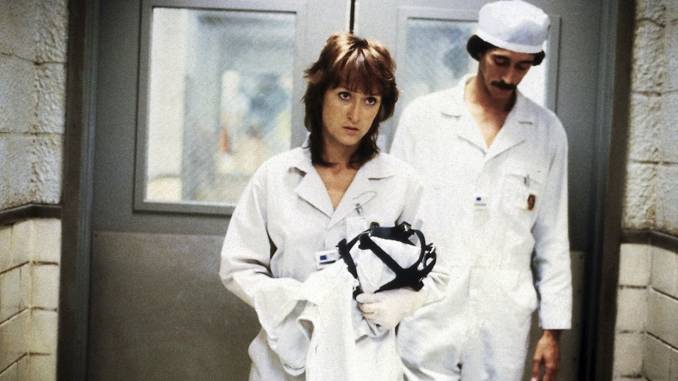Silkwood’s Chemistry-Filled, A-List Conspiracy Gave Mike Nichols a Win 40 Years Ago

Four years after Sally Field unionized her cotton mill in Norma Rae, and Jane Fonda uncovered terrifying wrong-doing at her local nuclear power plant in The China Syndrome, another legendary Hollywood actress did her very best to expose some deadly corporate malfeasance: Meryl Streep in Silkwood.
Streep plays Karen Silkwood, who lives with her boyfriend Drew (Kurt Russell) and their best friend Dolly (Cher). They are all workers at an Oklahoman plutonium plant, where they spend their days handling radioactive material without giving it much thought. After an increasing number of frightening incidents, however, Karen starts investigating the plant’s working conditions, and is horrified at what she finds. Her digging gets the attention of the higher-ups, and soon she’s facing even more immediate dangers than the specter of radiation poisoning.
You perhaps wouldn’t think that a Streep right at the start of her historic run of Oscar nominations, a Russell in the middle of his reign as ‘80s action hero par excellence, and a Cher transitioning from music to movie stardom, would all necessarily even belong in the same film. Yet so much of Silkwood relies on the pleasure they take in each other’s company, and we in theirs. It’s not hard to imagine the trio’s dynamic spilling out into a sort of southern, proto-Friends sitcom, with arguments about food, road trips to visit Karen’s estranged kids, and Dolly’s girlfriends becoming continuing plotlines.
That camaraderie extends beyond the central threesome too, with co-workers at the factory like David Strathairn (a lovely little moment where he helps Streep get gum off her face is an endearing precursor to their collaboration in The River Wild) and Fred Ward forming their own kind of unconventional family. For a good portion of Silkwood, corporate conspiracy takes a backseat to slice-of-life character study, the incipient flames of brewing disaster viewable just as a wispy plume of smoke, far in the distance.
That’s the genius of Nora Ephron and Alice Arlen’s screenplay: The texture of Karen’s day-to-day life is so vividly, lovingly, normally drawn, it makes the plunge into disaster hit all the harder. Silkwood was Ephron’s first produced screenplay, and notably different from the fluffier films she’d become famous for. But you can feel her there in the easy, funny exchanges between our trio, and Dolly’s sincere and gently rebuffed confession of love to Karen. There’s a buoyant, steely fragility to both Karen and Dolly that marks them out as the first Ephron heroines.
-

-

-

-

-

-

-

-

-

-

-

-

-

-

-

-

-

-

-

-

-

-

-

-

-

-

-

-

-

-

-

-

-

-

-

-

-

-

-

-








































